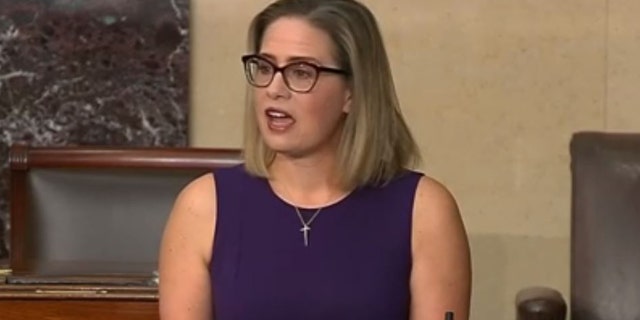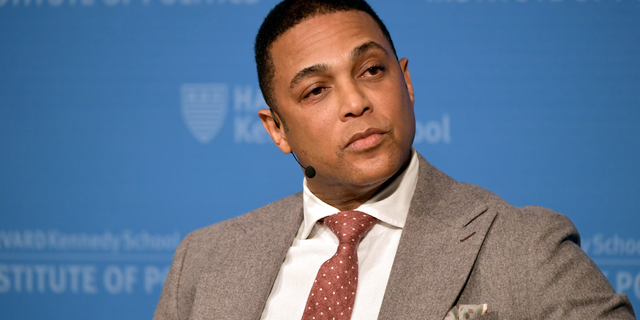by Andrew Kugle
News coverage of the filibuster often ignores Democratic flip-flops on issue
Sen. Joni Ernst: Changing filibuster rule is a ‘federal power grab’
Sen. Joni Ernst, R-Iowa, weighs in on senators Joe Manchin and Kyrsten Sinema upholding filibuster rule and reacts to the U.S. sending $308 million in aid to Afghanistan.
After a year of Senate Democratic Majority Leader Chuck Schumer, D-N.Y., and his party pushing to eliminate the legislative filibuster, news outlets have pushed a distorted and often biased narrative on this topic.
News coverage of the Senate filibuster debate often omits or downplays Democrats’ recent hypocrisy on the issue and fails to inform Americans of the role the filibuster serves in the Senate, according to Thomas Jipping, a senior legal fellow for the Heritage Foundation.
"I think many people get the impression that this is a new innovation that, you know, Republicans came up with just recently to stymie Democrats from doing what they want to do," said Jipping, who worked as a staffer for former Sen. Orrin Hatch, R-Utah, for 15 years. "But I think the media would serve the country better by a little bit of a civics lesson that the Senate is designed to handle legislation differently than the House and the requirement of a supermajority to end debate, even though a simple majority can still pass bills."
Instead, much of the coverage of the filibuster framing the debate mimics Democratic and liberal talking points. For example, the media often frames how eliminating the filibuster is necessary to save democracy in the United States.
BLACKBURN: DEMOCRATS DEPLOYING ‘LEGISLATIVE TRICKERY’ TO PUSH THROUGH VOTING BILL

Sen. Kyrsten Sinema, D-Ariz., delivers remarks on the Senate floor in support of the legislative filibuster, on Thursday, Jan. 13, 2022.
Sen. Kyrsten Sinema, D-Ariz., and Sen. Joe Manchin, D-W. Va., have been the target of progressives and the media for their repeated opposition to eliminating the filibuster. Manchin wrote an op-ed in April 2020 about how he doesn't support changing or removing the filibuster, yet he has been continually pressed over whether he'll change his mind.
A month after Manchin penned his op-ed, outlets still devoted enormous coverage to Manchin's filibuster stance. Transcript records show CNN and MSNBC talked about Manchin and the filibuster around 500 times each, starting in May 2021 until the end of the year. Similarly, the New York Times had over 350 stories where it mentioned Manchin and the filibuster, according to LexisNexis.
However, this focus on Sinema and Manchin often neglects other Democrats' recent flip-flops on the filibuster. In the early days of former President Trump’s administration, a bipartisan group of senators signed onto a letter from Sen. Susan Collins, R-Maine, and Sen. Chris Coons, D-Del., which called for the preservation of the legislative filibuster. Sixty-one senators signed onto the letter, including 27 Democrats who still hold federal office today. Vice President Kamala Harris was one of the Democrats who signed onto the letter when she was in the Senate, but is now calling the filibuster "arcane."
The New York Times, the Associated Press, and transcripts from ABC News, CBS News, and MSNBC didn't mention the 2017 letter throughout their coverage in 2021, according to LexisNexis. Reports about Democrats' push to eliminate the filibuster often forgo mention of Democrats’ previous support for the legislative filibuster throughout the Trump administration.
HERITAGE FOUNDATION SCHOLAR BREAKS DOWN ‘ABSURD’ FEDERALIZATION OF ELECTIONS IN DEMOCRATS' BILL
Sen. Brian Schatz, D-Hawaii, is one of the more liberal senators of the Senate, and he argued in 2017 that the Senate should keep the 60-vote threshold required to advance legislation for a vote.
"60 votes
easier to get than 51. Ignoring the other party creates rushed garbage
legislation. When you do 60, it’s a compromise," he said at the time.
60 votes easier to get than 51. Ignoring the other party creates rushed garbage legislation. When you do 60, it’s a compromise.
— Brian Schatz (@brianschatz) November 17, 2017
Jipping highlighted how when President Biden was in the Senate representing Delaware in 2005, he defended the filibuster.
"Joe Biden back in 2005 said we shouldn't let the dispute of the moment rob us of what history has given us in terms of the way the Senate is designed to operate. We separated the current controversy over the latest bill from the design and the function and the integrity of the Senate. And I think we ought to do the same today and the media could contribute to that, but I don't think it has," Jipping said.
Outlets rarely made mention of the 2017 letter. Sara Haines, co-host of ABC’s "The View," noted the letter in a June 2021 segment about the filibuster. CNN made at least two references to the 2017 letter, one by a guest and the other by an anchor. CNN host Pamela Brown referenced the letter in an interview with Arizona Secretary of State Katie Hobbs, D. The other mention of the 2017 letter was during an argument last year between CNN host Don Lemon and former Ohio Republican Governor John Kasich. Lemon argued for Democrats to eliminate the filibuster, while Kasich pointed out how many Democrats were opposed to axing it a few years prior.
"Now people say legitimately we can have a legitimate debate whether you should have a filibuster, whether you shouldn't," Kasich said. "But you can't have 31 Democrats saying in 2017 we shouldn't get rid of the filibuster, and now they turn around and say we have to get rid of the filibuster."
Lemon responded by asking Kasich if the Republican Party had changed since 2017 and argued Republicans are trying to stop people from voting so eliminating the filibuster is necessary to "save our democracy."

CAMBRIDGE, MA - FEBRUARY 22: CNN's Don Lemon speaks at Harvard University Kennedy School of Government Institute of Politics in a program titled "Race, Media and Politics" on February 22, 2019 in Cambridge, Massachusetts. (Photo by Paul Marotta/Getty Images) (Paul Marotta/Getty Images)
CNN LABELS KYRSTEN SINEMA A REPUBLICAN IN ON-AIR GRAPHIC
Lemon’s "save our democracy" justification for removing the filibuster is a talking point used by Democrats that's often repeated in the mainstream media. For example, the Washington Post published editorials calling on Congress to pass the Democrats’ election bills in order to save democracy at least six times in the past six months.
"State-level Republicans claim that making it harder to vote will safeguard democracy. In fact, they are imperiling it. Democrats’ efforts to make voting fairer and less complicated — and to make it harder to overturn legitimate election results — is the aid U.S. democracy really needs," the Post editorial board wrote earlier this month.
Weeks earlier, in a December editorial, the Washington Post claimed there was no "credible argument" against the Democrat bills. In November, it accused Republicans of tearing up democracy. It penned an October editorial titled, "Without these changes, U.S. democracy will remain vulnerable to Trump and other bad actors." Similar editorials were published in September and August.
Despite the advocacy for these bills by much of the media, Jipping argues Democrats and the press are pushing for the federal government to have authority over something under the authority of state governments.
"Someone may think that these
Democratic arguments are persuasive. They might think these policies and
some of these state laws are terrible. Congress does not have authority
to take action to seize power over state and local elections, and the
American people have to understand that better," Jipping said.
In order to paint the urgency needed to eliminate the filibuster, Democrats have at times accused Republicans and anyone who opposes their election bills as racist. Last week, President Biden linked opponents to figures like segregationist George Wallace and Confederate President Jefferson Davis.
"So I ask every elected official in America, how do you want to be remembered?" Biden said during remarks on voting rights. "Do you want to be on the side of Dr. King or George Wallace? Do you want to be on the side of John Lewis or Bull Connor? Do you want to be on the side of Abraham Lincoln or Jefferson Davis?"
Far-left MSNBC weekend anchor Mehdi Hasan called Biden’s comments "strong" and "necessary." He added Biden didn’t go far enough.
For the past year, Democrats have labeled Republican states passing election laws as the "new Jim Crow," referring to the term for laws that enforced segregation. This is another talking point the media has adopted in their coverage about the filibuster and voting rights, with show transcripts showing the phrase mentioned over four dozen times on CNN and MSNBC each.
"I don't
think many Americans will buy the suggestion that we are the same
country today as we were during Jim Crow," Jipping said. "I don't think
most Americans will accept the idea that when it's easier to vote than
ever, that somehow democracy and voting rights are hanging by a
thread."
Andrew Kugle is an editor for Fox News Digital. Story tips can be sent to andrew.kugle@fox.com and on Twitter: @AndrewJKugle.
Source: https://www.foxnews.com/media/how-the-media-pushes-a-misleading-narrative-on-the-filibuster-debate

No comments:
Post a Comment